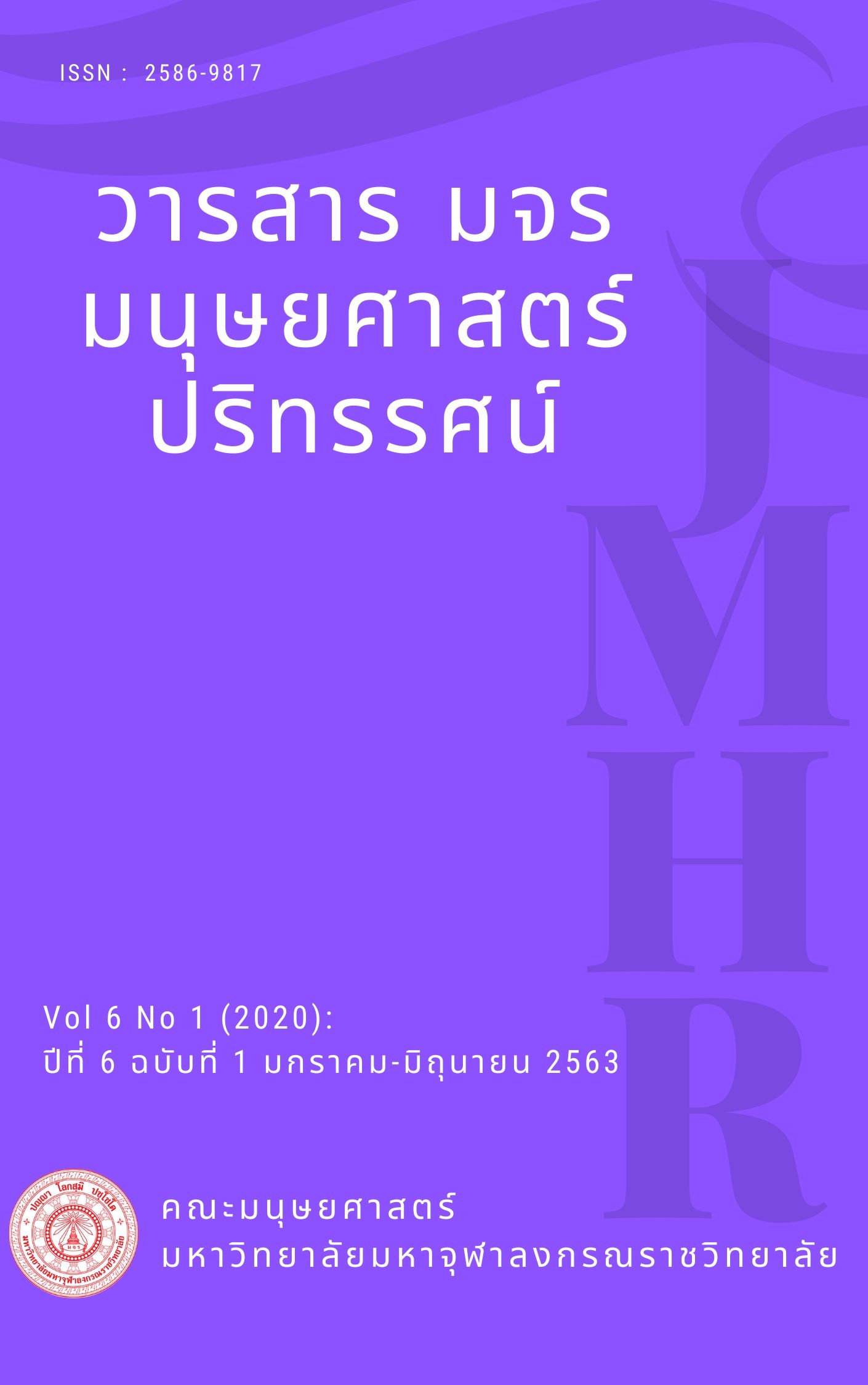การพัฒนารูปแบบการเปลี่ยนผ่านทางจิตตามหลักพุทธจิตวิทยา จำแนกตามประเภทจริต
คำสำคัญ:
จิต, จริต, การเปลี่ยนผ่าน, ความสุขบทคัดย่อ
การวิจัยนี้มีวัตถุประสงค์ 1) เพื่อศึกษาจิตและสภาวะของจริต 6 ตามหลักพุทธธรรม 2) เพื่อวิเคราะห์แนวทางการพัฒนาการเปลี่ยนผ่านทางจิตตามหลักพุทธจิตวิทยาจำแนกตามประเภทจริต และ 3) เพื่อนำเสนอรูปแบบการเปลี่ยนผ่านทางจิตตามหลักพุทธจิตวิทยาจำแนกตามประเภทจริต การวิจัยนี้เป็นการวิจัยแบบผสมวิธีแบบพหุระยะ (Multiphase Mixed Methods Research) มี 3 ระยะ คือ ระยะที่ 1 ใช้วิธีการวิจัยทางเอกสาร (Documentary research) และการสัมภาษณ์กลุ่ม (Group interview) ระยะที่ 2 ใช้การวิจัยแบบผสมวิธีด้วยวิธีการเชิงปริมาณ คือ การสำรวจ (Survey) เพื่อหาความสัมพันธ์ระหว่างจริต 6 กับความสุข 5 ด้าน กลุ่มตัวอย่าง คือ นิสิตระดับปริญญาตรี มหาวิทยาลัยมหาจุฬาลงกรณราชวิทยาลัย (ส่วนกลาง) จำนวน 302 รูป/คน ร่วมกับวิธีการเชิงคุณภาพ คือ การสัมภาษณ์กลุ่ม (Group interview) โดยนำข้อมูลทั้งเชิงปริมาณและคุณภาพมาวิเคราะห์ผลร่วมกัน และระยะที่ 3 ใช้การสนทนากลุ่ม (Focus group discussion) เป็นการตรวจสอบและยืนยันจากผู้เชี่ยวชาญ ทั้ง 3 ระยะจากผู้เชี่ยวชาญทางด้านอภิธรรมและจิตวิทยาร่วมสมัย จำนวน 10 รูป/คน โดยใช้การเลือกแบบเจาะจง วิเคราะห์ข้อมูลเชิงปริมาณด้วยการหาค่าสัมประสิทธิ์สหสัมพันธ์เพียร์สัน และวิเคราะห์ข้อมูลเชิงคุณภาพด้วยการวิเคราะห์เนื้อหาและการสร้างข้อสรุปแบบอุปนัย ผลการวิจัยพบว่า รูปแบบการเปลี่ยนผ่านทางจิตตามหลักพุทธจิตวิทยาจำแนกตามประเภทจริต มี 3 ขั้นตอน ขั้นที่ 1 รู้สภาวะอารมณ์ความรู้สึกของแต่ละจริต ความสุขและความคิดที่เกิดร่วม ขั้นที่ 2 รู้กระบวนการการพัฒนาการเปลี่ยนผ่านทางจิต และขั้นที่ 3 รู้เป้าหมายของสภาวะจิตที่ถูกพัฒนาแล้ว
เอกสารอ้างอิง
มหาจุฬาลงกรณราชวิทยาลัย. (2539). พระไตรปิฎกภาษาไทยฉบับมหาจุฬาลงกรณราชวิทยาลัย. กรุงเทพฯ: โรงพิมพ์มหาจุฬาลงกรณราชวิทยาลัย.
พระพรหมคุณาภรณ์ ป.อ.ปยุตฺโต. (2558). พุทธธรรม ฉบับปรับขยาย มัชฌิมาปฏิปทา (พิมพ์ครั้งที่ 41 ฉบับข้อมูลคอมพิวเตอร์ ครั้งที่ 10). กรุงเทพฯ: สำนักพิมพ์ผลิธัมม์.
ชุติมา พงศ์วรินทร์. (2554). ความสุขของนิสิตนักศึกษาในบริบทพุทธธรรม: การศึกษาข้อมูลเชิงประจักษ์ และการพัฒนามาตรวัด (วิทยานิพนธ์ศิลปศาสตรดุษฎีบัณฑิต สาขาจิตวิทยา). จุฬาลงกรณ์มหาวิทยาลัย. กรุงเทพฯ.
พระมหาสัจจวัฒณ์ วชิรญาโณ (ฉัตรไชยแสง). (2560). การเจริญวิปัสสนาตามหลักสติปัฏฐาน 4 เพื่อการปรับบุคลิกภาพ (วิทยานิพนธ์พุทธศาสตรดุษฎีบัณฑิต สาขาพุทธจิตวิทยา). มหาวิทยาลัยมหาจุฬาลงกรณราชวิทยาลัย. พระนครศรีอยุธยา.
โย่ง ศรีเวียน. (2561). การพัฒนาแบบประเมินเจตสิกปัจจัยทำนายบุคลิกภาพของผู้ปฏิบัติธรรม (วิทยานิพนธ์พุทธศาสตรดุษฎีบัณฑิต สาขาพุทธจิตวิทยา). มหาวิทยาลัยมหาจุฬาลงกรณราชวิทยาลัย. พระนครศรีอยุธยา.
วิจารณ์ พานิช. (2558). เรียนรู้การเปลี่ยนแปลง Transformative Learning. กรุงเทพฯ: มูลนิธิสยามกัมมาจล.
วรรณสิทธิ ไวทยะเสวี. (2556). คู่มือการศึกษา พระอภิธัมมัตถสังคหะ ปริจเฉทที่ 2 (พิมพ์ครั้งที่ 11). นครปฐม: มูลนิธิแนบมหานีรานนท์.
สุภีร์ ทุมทอง, ธานี สุวรรณประทีป และ วิโรจน์ คุ้มครอง. (2563). ปราโมทย์และปีติ ธรรมสมาธิ. นนทบุรี: บริษัท ภาพพิมพ์ จำกัด.






